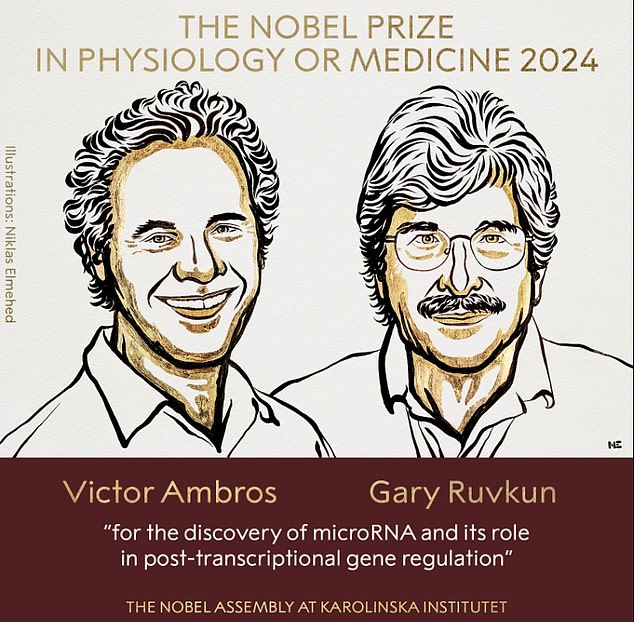Two American scientists whose pioneering work helped discover genetic codes that could unlock early tests to detect a deadly cancer were awarded the Nobel Prize in Medicine today.
Victor Ambros and Gary Ruvkun were credited with the discovery of microRNAs, small genetic codes that control a host of bodily functions.
One application could eventually be tests to diagnose certain cancers because microRNA is altered with certain diseases.
Every cell in the human body contains the same raw genetic information, locked in our DNA.
But the pair’s work explained how bone cells, nerve cells, skin cells, white blood cells, heart cells and many more use that genetic code in different, highly specialized ways.
Victor Ambros and Gary Ruvkun were credited with the discovery of microRNAs, small genetic codes that control a host of bodily functions.
The duo’s “groundbreaking discovery” has revolutionized medicine’s understanding of how our genes work inside the human body, the Nobel Assembly said.
“It revealed a completely new principle of gene regulation that turned out to be essential for multicellular organisms,” they added.
“It is now known that the human genome encodes more than a thousand microRNAs.”
Winners of the medicine and physiology prizes are selected by the Nobel Assembly of the Karolinska Institute in Sweden.
Previous winners in this field include a number of famous researchers, notably Alexander Fleming, who shared the 1945 prize for the discovery of penicillin.
The prizes include a cash prize of 11 million Swedish krona (£810,000).
The money comes from a legacy left by the prize’s creator, the Swedish inventor Alfred Nobel, who died in 1896.
Last year, the Medicine Prize went to Katalin Karikó and Drew Weissman, whose pioneering work helped create mRNA vaccines against Covid.
Before mRNA injections were rolled out to millions of people around the world to protect them against Covid, this technology was considered experimental.
Researchers are now exploring whether it could help fight cancer and other diseases.
Nobel season continues this week with the announcement of the winners of the Physics Prize tomorrow and the Chemistry Prize on Wednesday.
They will be followed by the long-awaited Literature awards on Thursday and Peace awards on Friday.
The Economics Prize will end on Monday, October 14.

